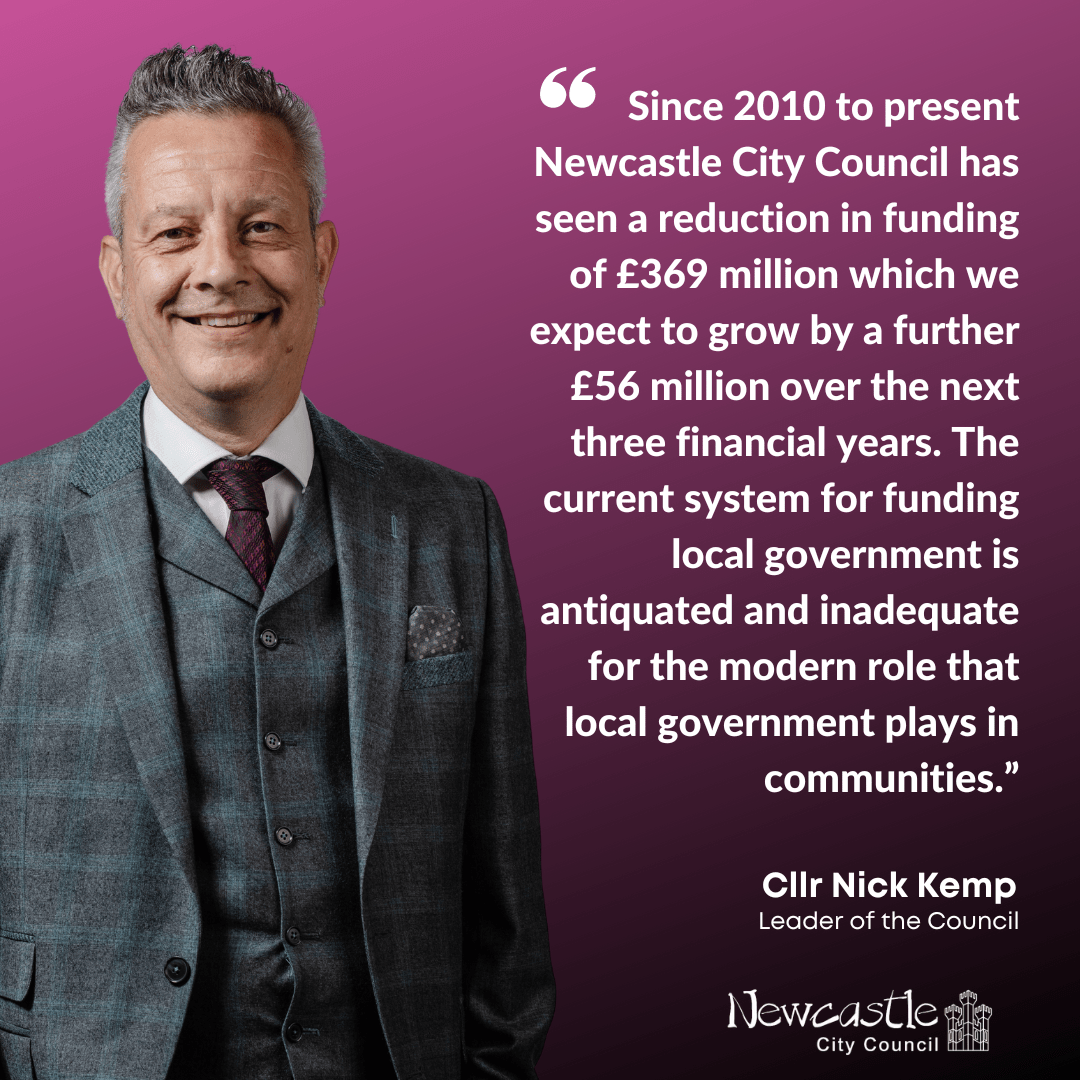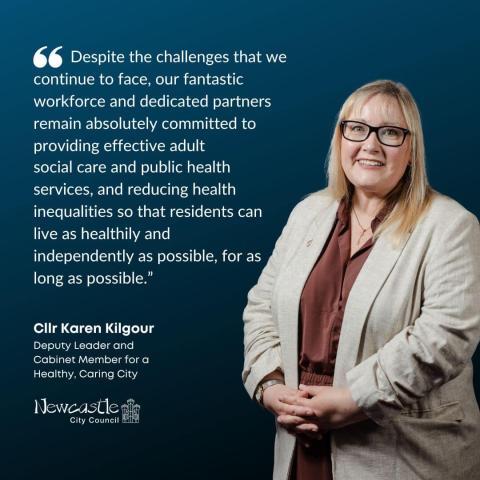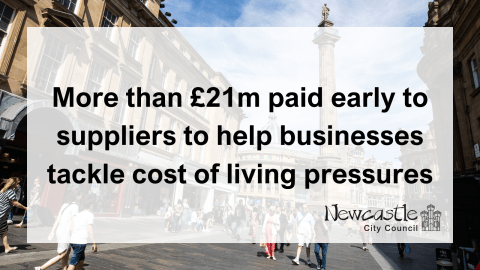16 November 2023
| | 6 min readOpen letter to Chancellor from council leader
Ahead of next week’s Autumn Statement, Cllr Nick Kemp, the Leader of Newcastle City Council, has written an open letter to Chancellor Jeremy Hunt.
Within the letter, Cllr Kemp calls for fair funding for local government, sustainable social care funding, an end to charges for council services, universal free school meals, and for the Household Support Fund to be made permanent among other things.
Read the letter in full below.

Dear Chancellor,
I write to you in anticipation of the Autumn Statement later this month, outlining the position of Newcastle City Council, and to ask you to take action to secure the future of local government in England and Wales.
Over the last 13 years, local government has experienced a deep shift in the services we deliver and the ways that we deliver them. Sustained budget cuts, ever-growing demand and shifting expectations of residents means that we must do a fundamentally different job now than when the Conservative Party entered Downing Street in 2010.
Fair funding for local government
Since 2010 to present Newcastle City Council has seen a reduction in funding of £369 million which we expect to grow by a further £56 million over the next three financial years. The current system for funding local government is antiquated and inadequate for the modern role that local government plays in communities. We have unpredictable, short term settlements making long term financial planning in the interests of residents and the public purse impossible. That is why we ask that government provides information spanning multiple years at the next local government finance settlement as this will help councils to plan in a more effective manner and invest in preventative services to deal with future demand for services.
Additionally, setting council tax bands on housing values from April 1991 punishes poorer areas and greatly benefits richer areas. To put this in perspective, we estimate that a 1% uplift in council tax for adult social care services in Newcastle in 2023/24 would be worth £1.2m, based on our current council tax base, but would be worth £8.3m in Surrey. Therefore, we call on your government to implement a Fair Funding Review with an appropriate needs weighting to adequately reflect the differences between the relative needs across the sector and the ability to raise funding to support services. This should provide certainty of funding over multiple years to allow for more effective financial planning.
Business rates reform
The success of our local businesses in growing an inclusive local economy benefits not only Newcastle and the North East, but the whole country. The significant contribution that business rates can make to the funding of council services across the country must be distributed equitably for the development of thriving local economies. For too long regional inequality has been allowed to balloon because businesses in and around London have been given unfair advantage. For you to really level up this country we not only need a system which puts the rest of the country on a par with London and the South East but one that advantages the talent and workforce in all other regions of this country, not to the detriment of London and the South East but to reduce the gap that exists across this country. A system where income generation is not based on the ability to generate locally because those who already have, have more, and those without remain without. I call on you now to implement a system of equalisation of income generated by local authorities through council tax and business rates. Distribution of income based on need makes ultimate sense for levelling up, for countrywide recovery from economic shocks, and for a healthier UK.
Addressing regional inequality
This government speaks of levelling up but the ad-hoc single-issue competitive-bid-based funding rounds will not get us there. Regions across the country are crying out for infrastructure investment, that will let business grow, and productivity improve, which will also let business grow. The current system which uses strict regulations to decide what local authorities can bid for rather than allowing for investment in local priorities which could have a much greater benefit to communities across this country. Local authorities across this country set strategies for investment based on local knowledge and need, your government makes all of us chase pots of funding around your own priorities rather than making the most important improvements in an area.
Inequality has undoubtedly widened in our country and this city throughout Covid and during the cost of living crisis. IPPR North research1 shows that the Levelling Up programme continues to be ill-defined and leaves significant room for the appearance of progress and delivery and it remains the most regionally unequal advanced economy. As part of this, support for people in the north is needed more than ever. That is why we are requesting the Government fulfils it promises in the twelve Levelling Up missions and continues to support residents throughout the cost of living crisis by making extend funding for the Household Support Fund beyond March 2024 and making it permanent for struggling families. Further to this government should alleviate any extra squeeze on people’s finances by banning charges on residents for services that they expect us to do and funding us directly. Things like replacing bins that are damaged or adult social care fees. These should be directly funded by government, for communities to save people across this country when times are hardest.
I also ask that you commit resources to making free school meals universal to all children. No child should go to school hungry, distracted from class, unable to engage, socialise and develop. This is an issue of nutrition and health as much as education and we should ensure this basic need to all.
Procurement Reform
A key point of our inclusive economic strategy is to spend limited resources locally to stimulate the local economy. Local procurement is a vital tool for councils to grow and protect local markets and drive inclusive economic growth in their area. For this tool to be at all effective, it must be scaffolded by procurement policy and regulation that truly supports commissioning authorities to design and develop value for money procurement programmes that both meet local need and nurture local markets to embed themselves in the local economy.
The current procurement reform process promises a wider consideration of economic value in decision making, and I welcome this focus. Once again, this valuable opportunity for local councils cannot be effectively employed if the budgets are so tight that we can consider little other than cost. Reform proposals to fund the administration of new procurement processes through charges to successful suppliers do little to mitigate this issue when the suppliers in question are delivering services to reduced budgets and increasing demand or are local SMEs or Voluntary and Community Sector Organisations. Local government needs to be able to procure items locally because the circular spend in local economies is vital for people’s livelihoods and their businesses. But we should be able to provide social good to residents who need it. Society needs local SMEs, Co-operatives, and the VCS to thrive and the values they provide to communities goes beyond the monetary savings of remote national/international providers.
Adult Social Care reform and funding
Social care has been underfunded for a decade. Since 2013/14 there has been an average increase of 2.6% per year, despite demographic pressures alone growing by 3.4% per year. An extra £8.4bn will be required by the next fiscal year to meet existing and unmet demand and meet the fair cost of care 2. Government plans for reform have yet to be funded and are placing additional burdens on local authorities. This includes additional burdens relating to the new regulatory assurance framework for adult social care, and the underfunded Fair Cost of Care and Cap on Care Costs proposals. Short-term and competitive funding pots mean that local areas cannot plan and cannot always use the funding on those things that would make the biggest impact locally. We need to create resilience in the social care sector and make it an area where people feel valued in their work. Building retention starts with pay and improving the working conditions for people in one of the most emotionally distressing and demanding jobs there are. This goes against the ethos of Best Value. Disparate funding regimes between DHSC and DLUHC, as well as overly burdensome reporting requirements take capacity away from the frontline and create artificial divides between funding pots and partner organisations. This can make it difficult to work in an integrated way and join up care for people. While the introduction of Integrated Care Systems was supposed to put ‘places’ in control of health and care funding and decision making, many local places have yet to see the devolution of funding and powers to do this.
Voluntary and Community sector support
This leads to voluntary and community sector (VCS) organisations having to pick up the slack that local government is just not designed to undertake anymore. They are under-resourced, and a loop is being created where they are being told to rely on local government for support while councils are relying on them to fulfil roles they can no longer meet. This is completely unsustainable. Now voluntary and community sector organisations are being forced into similarly inappropriate models of income generation that do not reflect their purpose. Data from the Community Foundation3 shows that the willingness of medium4 and large5 third-sector organisations to bid for public sector contracts falling massively from 2016 to 2022 with a 32% fall and 29% in the rate that these organisations bid for or deliver public sector contracts, respectively. That is why I am calling on your government to review the way that the VCS can access public sector contracts. By levelling the playing field, through making bidding for public sector contracts achievable and effective we can support our community organisations across this country to do more social and public good.
The role of local government within communities has transformed completely in the last 13 years. It is time that we reflect those changes in expectations of residents by giving local government the funding changes that it requires to be successful in the modern landscape.
Yours sincerely,
Cllr Nick Kemp,
Leader of Newcastle City Council
If you would like to give us feedback on our website, please complete this short online form.







